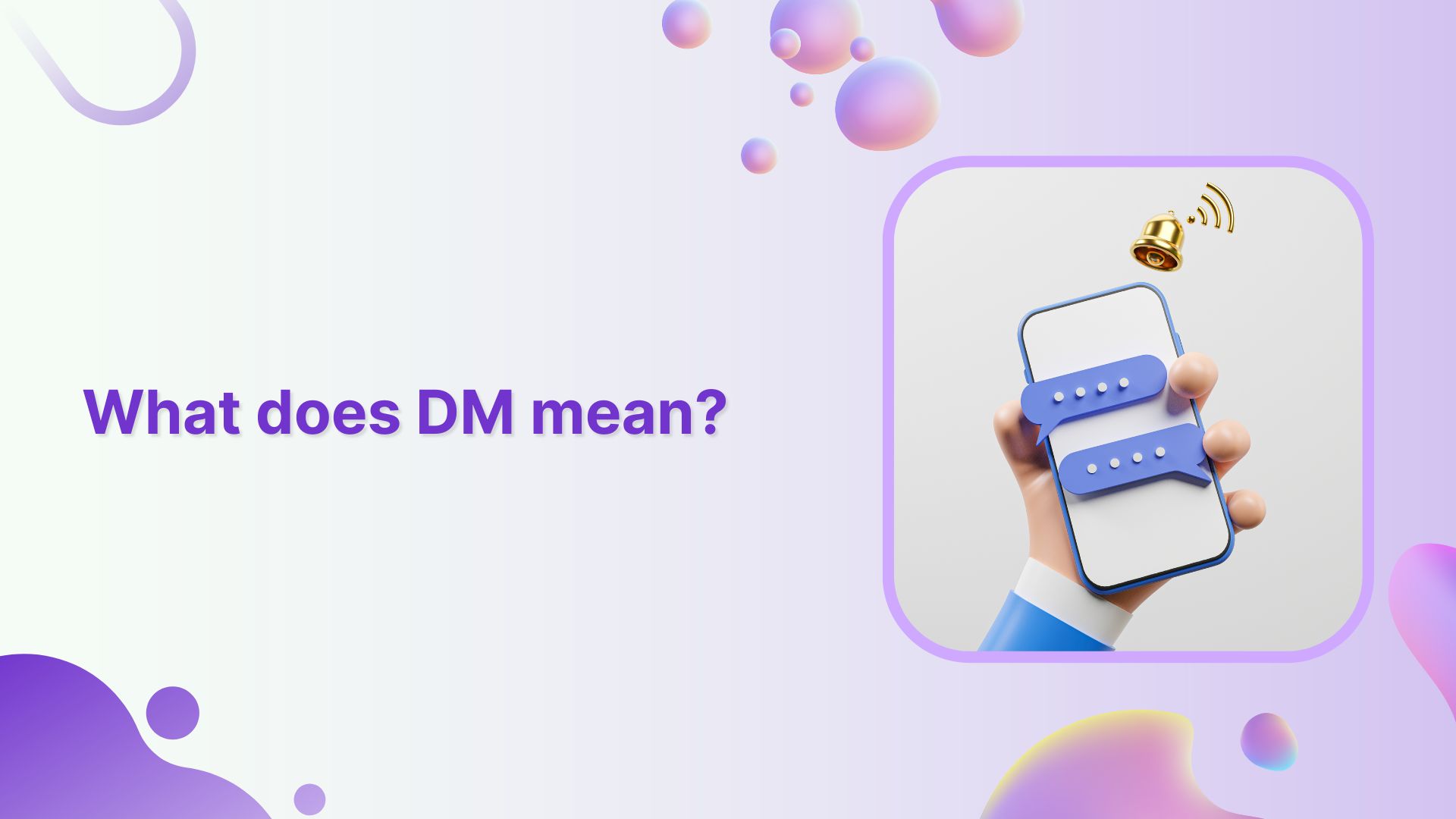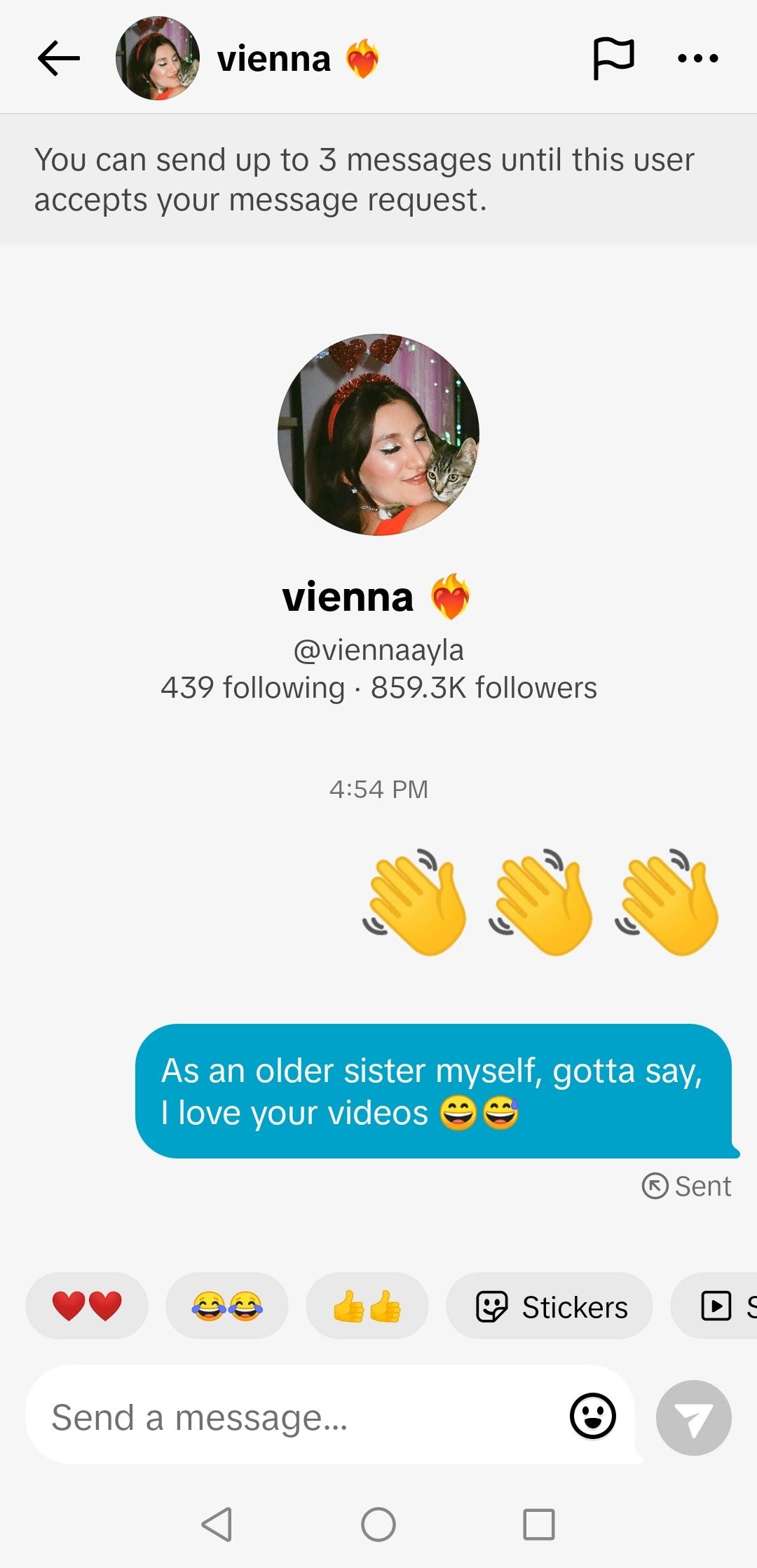What Does DM Mean? Your Guide To Direct Messages On Social Media
Have you ever scrolled through social media and seen someone say "DM me" or wondered what a "DM" even is? It's a pretty common sight these days, and honestly, understanding what does DM mean is a really helpful step for anyone using online platforms. This simple abbreviation, you know, it pops up all over the place, and it's something many people use daily without even thinking twice about it.
Basically, a DM is a direct message, a private chat between people on social media. It’s a way to talk to someone without everyone else seeing your conversation. Think of it like passing a note in class, but for the internet, so it's a bit more advanced than that, obviously.
We're going to look closely at what does DM mean, where it came from, and how people use these private chats on different apps. You'll learn how to send them, what they're good for, and even discover some other, less common meanings for "DM" that you might run into. So, stick with us, because this information, it could be quite useful for your online interactions.
- Sid From Toy Story
- David Bromstad Married
- Is Michael Jackson Still Alive
- How To Measure Inseam
- Susan Mikula Photography
Table of Contents
- What Exactly Does DM Mean?
- The Rise of the Direct Message: A Little History
- Where Can You Send a DM?
- How People Use DMs
- DM vs. PM: Is There a Difference?
- Other Meanings of "DM" (Beyond Social Media)
- Tips for Using DMs Effectively
- Frequently Asked Questions (FAQs)
- Conclusion
What Exactly Does DM Mean?
At its core, "DM" is a very common abbreviation for "direct message." It's a way for people to have a private conversation with someone online, usually on a social media platform. So, instead of posting something publicly for everyone to see, you can send a message directly to one person or a small group, which is quite handy, you know.
This kind of communication, it's pretty much hidden from the public eye. What you talk about in a DM stays between you and the person or people you're messaging. It's a private space, which is, honestly, a big part of its appeal. My text shows that a DM is a "private communication between social media users," and that's a perfect way to put it, really.
The whole point of a direct message is to offer a more personal way to connect. You might want to share something that isn't for general consumption, or perhaps you need to discuss something sensitive. It allows for a more focused interaction, away from the general noise of public feeds. It's like having a side conversation at a party, but online, you know, just between a few folks.
- Drew Pritchard En La Actualidad
- Cách Tạo Tài Khoản Flow
- Whistle Express Car Wash
- Remoteiot Vpc Ssh Windows 10 Without
- Jojo Siwa Magazine Cover
The Rise of the Direct Message: A Little History
The concept of sending a private note online isn't new, but the term "DM" really gained traction with the growth of social media. Twitter, for instance, played a significant role in popularizing "DM" as the go-to term for private messages on its platform. It allowed users to send messages directly to other users, even if they weren't publicly following each other, which was, you know, a pretty big deal at the time.
Before "DM" became so widely used, another term, "PM," short for "private message," was quite popular. PM, it typically found its home on forums and, notably, on Facebook, especially in its earlier days. So, while the functionality was there, the specific language people used to describe it, that sort of shifted over time. It's interesting how these things evolve, isn't it?
The convenience of direct messaging, it just made it stick. People needed a quick way to refer to these private chats, and "DM" was short, snappy, and easy to understand. It became part of the everyday language of internet users, a bit like saying "LOL" or "BRB." It's just one of those terms that, honestly, became indispensable very quickly.
Where Can You Send a DM?
The beauty of direct messages is that they're almost everywhere online where people interact. If there's a platform where you can connect with others, chances are it has some form of private messaging. My text mentions several popular places where you can send a DM, and it's quite a comprehensive list, actually.
Popular Social Platforms
You'll find DMs on pretty much all the big social media sites. Instagram, for example, has its own robust direct messaging system, allowing users to share photos, videos, and text privately. It's a very visual way to connect, which is, you know, characteristic of Instagram itself.
Twitter, now known as X, was, as we discussed, a major player in making "DM" a household term. You can send private notes to other users there, which is quite useful for more personal conversations or quick exchanges. Facebook, too, has its Messenger service, which functions as its primary direct messaging tool, allowing for chats with friends and family, and even group discussions, so it's very versatile.
Platforms like Twitch, which is a big hub for live streaming, also offer direct messaging. This allows viewers to connect privately with streamers or with each other, which can be really helpful for community building or asking specific questions. It's a way to bridge the gap between public interaction and private conversation, you know, making the whole experience a bit more personal.
Other Messaging Places
Beyond the main social media giants, many other online services and apps use direct messaging. This includes various messaging apps designed specifically for private communication, like WhatsApp or Telegram, though they might not always use the exact "DM" terminology. However, the core function, that of sending a private message, is exactly the same, which is, honestly, what matters most.
Even professional networking sites or online forums often have a private message feature. This allows users to connect one-on-one for specific discussions, collaborations, or even job opportunities. So, the concept of a direct message, it's pretty universal across the internet, offering a personal channel in a largely public space, which is, you know, a very important distinction.
How People Use DMs
People use DMs for a whole bunch of reasons, both personal and professional. It's a really versatile tool, honestly, and its uses are as varied as the people who send them. My text highlights that DMs are for "private communication between two people on social media," and that covers a lot of ground, you know.
Personal Chats
For individuals, DMs are perfect for catching up with friends, sharing inside jokes, or discussing sensitive topics that you wouldn't want to post publicly. You might send a funny meme to a friend, plan a surprise party, or offer a word of encouragement. It’s a space for genuine connection, a bit like a phone call, but in text form, which is, you know, often more convenient.
They're also great for making new connections. If you see someone online who shares your interests, a polite DM can be a good way to start a conversation without putting yourself out there for everyone to see. It’s a way to test the waters, so to speak, in a more private setting, which can be, honestly, less intimidating for some people.
Business and Marketing
Brands and businesses have really started to understand the value of DMs. They use them for customer service, answering questions, or resolving issues directly and efficiently. It’s a much more personal touch than a public comment, and customers often appreciate that direct line of communication, which is, you know, a smart business move.
Marketers also use DMs for targeted outreach, sending special offers or personalized messages to potential customers. My text points out that brands can use DMs for marketing on social media, finding out the "benefits, best practices and restrictions of DM platforms." It's a way to build relationships and trust, rather than just broadcasting messages, which is, honestly, a much more effective strategy.
Managing these messages, especially for a business, can get a bit much. Tools like Metricool, mentioned in my text, help brands keep track of their direct messages, making sure no customer query goes unanswered. It's all about staying organized and responsive, which, you know, is key to good customer relations.
"DM Me": What It Really Means
When someone says "DM me," they're simply asking you to send them a direct message. It's an invitation to take a conversation from a public space, like a comment section, into a private one. This often happens when a topic becomes too personal for public view, or if someone needs specific information that shouldn't be shared widely, which is, you know, a very practical use.
It's a way to shift the conversation, basically. You might see a post about a product, and the company might say "DM us for pricing." Or a friend might post about a personal event and add "DM me for details." It's a clear signal that the next part of the discussion should be private, which is, honestly, very straightforward.
DM vs. PM: Is There a Difference?
This is a common question, and the short answer is: not really, in terms of function. "DM" and "PM" both refer to a private message sent online. My text confirms this, stating, "The term is interchangeable with pm, which stands for private message." So, you know, they're essentially the same thing, just different ways of saying it.
As mentioned earlier, "PM" (private message) tended to be more popular on platforms like Facebook and older online forums. "DM" (direct message), on the other hand, really took off with Twitter. So, the difference is mostly about which platform popularized which term, rather than a fundamental difference in what they do. It's like calling a soda "pop" in one region and "coke" in another, you know, same drink, different name.
Today, "DM" is arguably the more widely recognized term across most social media platforms. However, if someone says "PM me," you'll still understand they mean a private message. It's good to know both, honestly, so you're never confused, which is, you know, just smart practice.
Other Meanings of "DM" (Beyond Social Media)
While "direct message" is the most common meaning for "DM" in online communication, it's worth noting that this abbreviation can have other meanings in different contexts. It's not super common, but sometimes you'll see "DM" used for entirely different things, which is, honestly, a bit surprising to some people.
Designated Market Areas (DMAs)
In the world of marketing and broadcasting, "DMA" stands for "Designated Market Area." This is a geographical area in the United States where the population receives the same television and radio station broadcasts. My text mentions, "Welcome to the dynamic world of designated market areas (dmas),Whether you’re a marketer, advertiser, broadcaster, or simply a curious reader, understanding dmas is crucial in." So, it's a very specific term for a very specific industry, you know.
Marketers use DMAs to define regions for advertising campaigns, understanding where their target audience is located based on media consumption. It helps them figure out where to place ads to reach the most people effectively. So, if you're ever looking at advertising data, you might see "DMA" pop up, and it has nothing to do with private messages, which is, honestly, a completely different ballgame.
Technical and Product Contexts
Occasionally, "DM" can appear in product descriptions or technical specifications, where it might stand for something else entirely. My text gives a couple of interesting examples, like a "Kenwood 6.2 built in bluetooth in dash cd/dvd/dm receiver black products at best buy." Here, "DM" might refer to "digital media" or a specific model identifier, so it's very context-dependent, you know.
Another example from my text talks about a "red light on my shredder for this particular model." In such cases, "DM" could be part of a model number or an internal abbreviation for a specific component or function within that product. These uses are usually very niche and specific to the product or industry, so you wouldn't typically encounter them in everyday conversation. It's just a reminder that abbreviations can be tricky, honestly, and mean different things depending on where you see them.
Tips for Using DMs Effectively
Using DMs well can really improve your online experience, whether you're chatting with friends or running a business. Here are some pointers to help you make the most of them, because, honestly, a little thought goes a long way.
- Be Clear and Concise: Get to the point. People appreciate messages that are easy to read and understand quickly. Avoid long, rambling texts, especially for initial contact, you know.
- Be Respectful: Always maintain a polite and appropriate tone. Remember that even though it's private, it's still a real person on the other end. So, good manners, they're always in style.
- Respond Promptly (Especially for Businesses): If you're using DMs for customer service, quick responses are key. Customers expect timely replies, and delays can lead to frustration, which is, you know, not good for business.
- Check Your Settings: Most platforms let you control who can send you DMs. Adjust these settings to your comfort level to avoid unwanted messages. This is, honestly, a very important privacy step.
- Don't Spam: Avoid sending unsolicited promotional messages or too many DMs to people who haven't expressed interest. This can be annoying and might even get your account flagged, so, you know, be mindful.
- Move Public Conversations to Private When Needed: If a public comment thread starts getting too personal or complicated, suggest moving the discussion to a DM. It's a good way to manage information and privacy, which is, honestly, very thoughtful. Learn more about direct messages on our site for more tips.
Knowing how to send a DM is one thing, but using them thoughtfully is another. These tips can help ensure your direct message interactions are positive and productive, which is, you know, what everyone wants.
Frequently Asked Questions (FAQs)
Many people have similar questions about direct messages. Here are some common ones that come up, which is, you know, pretty natural given how much we use them.
Is a DM always private?
Yes, generally speaking, a direct message is intended to be a private communication between the sender and the recipient(s). Unlike public posts or comments, DMs are not visible to everyone on the platform. However, it's always wise to remember that the person you're messaging can still take screenshots or share the content of your message with others, so, you know, always be careful about what you share.
Can anyone DM me?
This really depends on your privacy settings on each specific platform. On many social media sites, you can adjust who is allowed to send you a direct message. For instance, you might set it so only people you follow can DM you, or you might allow messages from anyone. It's a good idea to check your settings on each app to make sure they align with your preferences, which is, honestly, a very important step for your online safety.
What does "DM me" mean?
When someone says "DM me," they are simply asking you to send them a direct message. It's an invitation to communicate privately, often to share more details, ask a specific question, or discuss something that isn't suitable for a public comment section. It's a very common phrase, and it's basically a call to action for a private chat, which is, you know, pretty straightforward.
Conclusion
So, we've covered quite a bit about what does DM mean, haven't we? It's clear that a direct message is a really important part of how we communicate online, offering a private space for conversations away from the public eye. From its origins, mainly with Twitter, to its widespread use across almost every social media platform, DMs have become an indispensable tool for personal chats and even for businesses, which is, honestly, a testament to their usefulness.
We've seen how "DM" is largely interchangeable with "PM," and we even touched upon some of its less common meanings in other fields, like marketing's Designated Market Areas or technical product descriptions. Understanding these different uses, it just helps you navigate the digital world a bit more confidently, you know. Using DMs effectively means being clear, respectful, and mindful of your privacy settings, which are, honestly, good practices for all online interactions.
- Aime Leon Dore Hat
- Ulta 21 Days Of Beauty
- Why Are People Boycotting Target
- Remoteiot Vpc Ssh Windows 10 Without
- Cast Of Kpop Demon Hunters

What Does DM Mean And How Can You Use It For Marketing?, 44% OFF

What Is a DM? What DM Means on Social Media

What Is a DM? What DM Means on Social Media